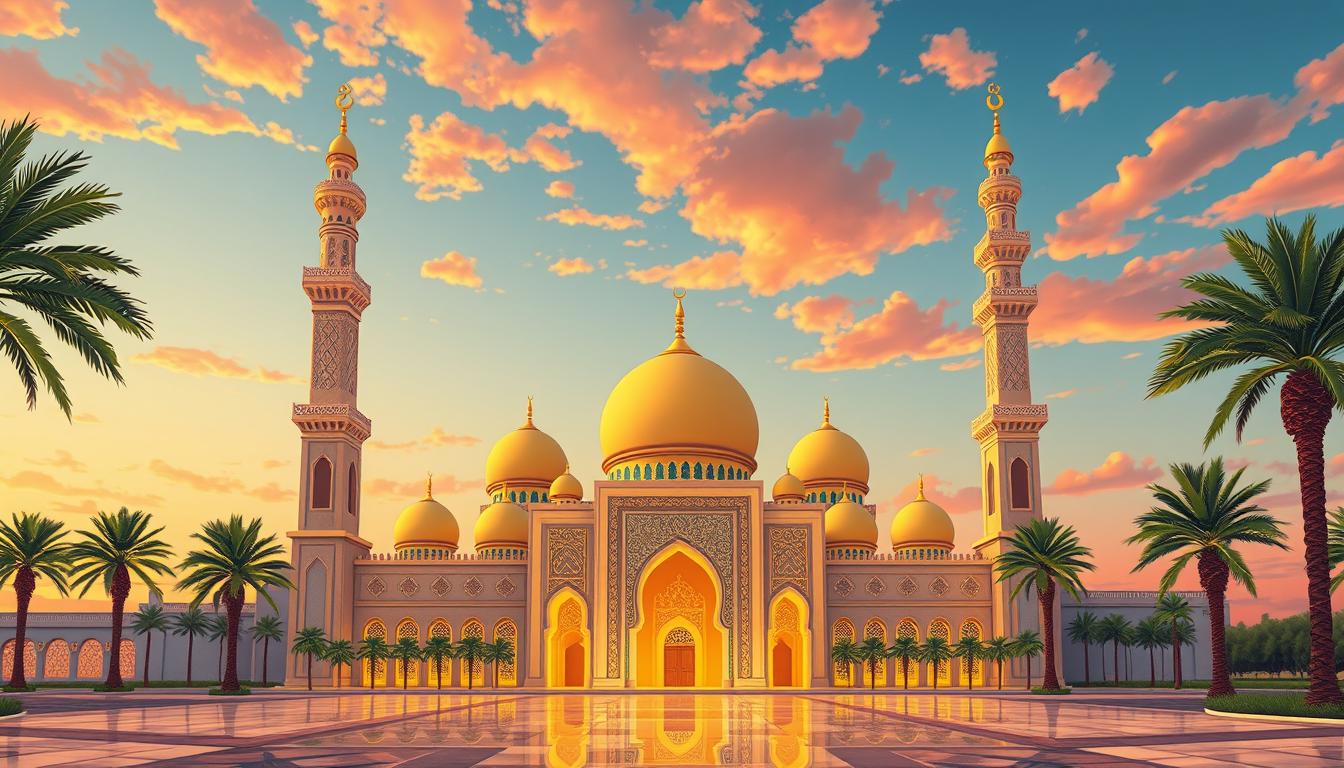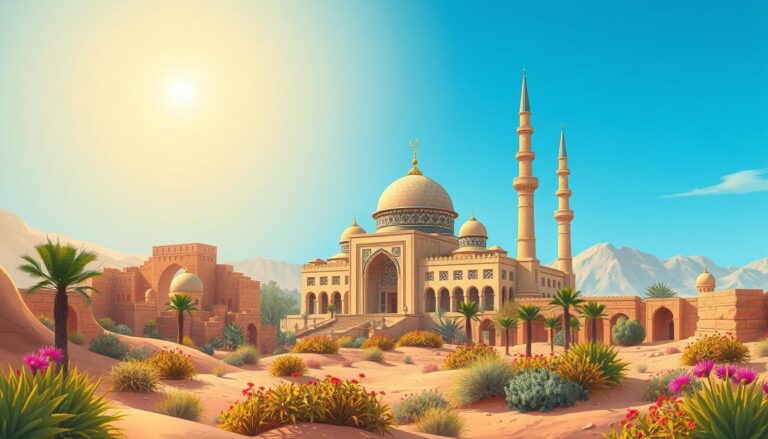Islam in Qatar
Qatar, a small country in the Arabian Gulf, is mostly Muslim. Islam shapes its culture, identity, and norms. With 62.5% of the population Muslim, Islam deeply influences daily life for both locals and expats.
Islam arrived in the Arabian Peninsula in the 7th century. Qatar’s people adopted it early on. By the 7th century’s end, most Christians had converted or left, making Qatar mostly Muslim. Today, Qatar follows Sunni Islam, like Saudi Arabia.
Qatar’s Islamic influence is seen in its mosques, schools, and Sharia law. It supports Islamic values at home and abroad. This shows Qatar’s dedication to Islamic teachings.
As Qatar grows, Islam’s role in its future is key. Knowing about Islam in Qatar helps understand the country and its people better.
Introduction to Islam in Qatar
Islam has deeply shaped Qatar’s culture and heritage. The country’s Islamic history began in the 7th century. This is when Islam first spread across the Arabian Peninsula.
Today, you can see this history in Qatar’s mosques and Islamic buildings. For example, the Imam Muhammad ibn Abd al-Wahhab Mosque is named after a famous scholar.
Qatar’s constitution makes Islam the official religion. This has greatly influenced its society. It affects everything from how the country is run to what people learn in school.
The Ministry of Islamic Affairs helps make sure Islamic values are part of everyday life. This ensures that Islam is deeply rooted in Qatar’s culture.
Islam’s impact goes beyond just religion in Qatar. It influences the country’s culture and social life. Islamic traditions and customs are a big part of Qataris’ daily lives.
This has helped create Qatar’s unique identity. It makes the country proud of its heritage.
Demography and Sects of Islam in Qatar
Qatar is a country with a rich Islamic heritage. The majority, over 90%, are Sunni Muslims. About 10% are Shia Muslims.
Sunni Islam: The Predominant Sect
The Sunni Muslims in Qatar mostly follow the Salafi interpretation of Islam. This is the official Sunni Islam in the country. The state mosque is named after Muhammad ibn Abd al-Wahhab, a Salafi scholar.
Shia Muslims: A Minority Community
Shia Muslims in Qatar enjoy religious freedom. Some have even held government jobs. Yet, there have been conflicts between Shia and Sunni Muslims.
In 2011, Wahhabi extremists tried to destroy a Shia cemetery near Doha. The Emir of Qatar condemned this act. He also attended a Shia funeral to show respect.
“Qatar has successfully negotiated its existence between global powers, including the British and Ottoman Empire, and elements within Saudi Arabia, Bahrain, and Iran throughout its history.”
Islamic Education and Institutions in Qatar
In Qatar, Islamic studies are very important. At universities like Qatar University and Hamad Bin Khalifa University, students can learn about Islam. They even offer a master’s degree in Islamic studies.
Sheikha Moza bint Nasser, the wife of the former Emir, is a notable graduate. She is the mother of the current Emir.
Islamic Studies at Universities and Centers
The Center for Islamic Legislation and Ethics (CILE) is a key place in Qatar. It focuses on Islamic scholarship and dialogue. This center helps spread Islamic education and encourages deep thinking about Islam.
Mosques and Islamic Cultural Centers
Qatar has many mosques and Islamic cultural centers. These places are important for religious and community activities. The Fanar, Qatar Islamic Cultural Center, is a big example.
It has one of the largest mosques in Qatar. It also offers many activities, like social and educational programs. The Abdulla Bin Zaid Al Mahmoud Islamic Cultural Center in Doha also offers Arabic lessons and supports the Muslim community.
“Islamic education is not just about memorizing scriptures; it’s about cultivating a deep understanding of our faith and its relevance in the modern world.” – Dr. Khalid Al-Qahtani, Dean of the Faculty of Islamic Studies, Hamad Bin Khalifa University
Islamic Laws and Regulations in Qatar
Qatar’s laws are deeply rooted in Sharia law. The constitution says Sharia is a key source of laws. The country has strict rules against insulting Islam or its practices. Changing one’s religion from Islam is illegal, but there have been no punishments since 1971.
The government controls religious activities closely. Non-Muslim groups must register with the Ministry of Foreign Affairs to operate. Qatar’s laws mix civil and Islamic rules, with Sharia playing a big role in family and criminal laws.
In 2019, there were 375 cases of flogging in Qatar, the US Department of State reported. These were for drinking alcohol and having illicit sex. Apostasy can lead to death, blasphemy to up to seven years in prison, and spreading other religions to 10 years.
Homosexuality is a crime, with Muslims facing up to death. Non-Muslims can get up to 5 years in prison. Qatar allows some alcohol sales, mainly in luxury hotels, but Muslims caught drinking face harsh penalties.
“The UN Committee Against Torture found that practices such as flogging and stoning, still included in Qatari Criminal Code as criminal sanctions, constitute a breach of the obligations imposed by the UN Convention Against Torture.”
Human rights in Qatar are a concern. Human Rights Watch said in 2012 that migrant workers face exploitation and abuse. This can be forced labor.
In summary, Islamic laws and regulations deeply shape Qatar’s legal system and society. Shariah law is a key source of laws, affecting many aspects of life for everyone in Qatar.
Islam in Qatar and Its Influence on Society
Islam is a big part of Qatari culture. It shapes the country’s values, traditions, and daily life. Important Islamic holidays like Ramadan and Eid al-Fitr bring people together. During Ramadan, Qatar’s cities look festive, with special events and promotions.
Islamic values like hospitality and charity are common in Qatar. Qataris often gather with neighbors and the less fortunate. This shows the importance of these Islamic values in Qatar.
Islamic Values and Traditions in Qatari Culture
Islam affects Qataris’ daily lives, customs, and routines. They follow the five daily prayers, Ramadan, and Halal dietary restrictions. These show how Islamic traditions in Qatar are part of Qatari society.
Role of Islam in Daily Life and Practices
The Qatari government supports Islamic practices in Qatar and Islam in daily life in Qatar. The Ministry of Islamic Affairs sets religious policy. It also ensures Islamic education in state schools, strengthening Islam’s role in society.
“Islam is not just a religion in Qatar, but a way of life that shapes the country’s culture, values, and daily practices.”
Islamic Holidays and Celebrations in Qatar
Qatar celebrates many public holidays based on Islamic traditions. These holidays show the country’s strong connection to its faith. The most important ones are Ramadan and the two Eids – Eid al-Fitr and Eid al-Adha.
Observance of Ramadan
Ramadan is the ninth month of the Islamic calendar and is very special for Muslims in Qatar. People prepare and come together for rituals and gatherings. For example, they celebrate Sha’ban, the month before Ramadan, with festivities.
During Ramadan, people fast from dawn to sunset. They eat a pre-dawn meal called suhur and a sunset meal called Iftar. The Iftar meal is special and is marked by the sound of a Ramadan cannon.
Eid al-Fitr and Eid al-Adha
Eid al-Fitr marks the end of Ramadan and is a time of joy and togetherness. It’s celebrated with prayers, feasts, and gifts for children. Eid al-Adha honors the story of Ibrahim (Abraham) and his willingness to sacrifice his son for God. It’s also a time of prayer, giving to others, feasting, and exchanging gifts.
Qatar’s Islamic holidays and celebrations are a big part of its culture. They show how important religion is in Qatari society.
Islam in Qatar: A Global Influence
Qatar is now a key player worldwide, pushing for Islamic teachings and dialogue. It shows its dedication to being a major force in the Muslim world.
Qatar’s Role in Promoting Islamic Teachings and Dialogue
Qatar has hosted many interfaith dialogue conferences. These events help people from different cultures understand each other better. The Doha International Center for Interfaith Dialogue (DICID) is a key place for these talks.
The Qatar Foundation also explores how Islam and science meet. It recently started the Society for Muslim Scientists. This shows Qatar’s interest in both Islamic teachings and scientific discovery.
Qatar invests heavily in education, spending billions in the US. This shows its aim to spread Islamic teachings and dialogue globally.
“Qatar has become a center for Islamic art, with a huge collection in museums. The Museum of Islamic Art in Qatar showcases Islamic history from all over, showing Qatar’s dedication to Islamic culture.”
Qatar stands strong in international politics, even as a US ally. Its support for Palestine shows its commitment to its Islamic values.
Islam deeply influences Qatar’s culture and daily life. Women have easy access to mosques, and Islamic phrases are common. This shows Qatar’s strong Islamic identity.
As Qatar grows in influence, it continues to promote Islamic teachings and dialogue. This shows its commitment to its Islamic heritage and its role as a leading Muslim voice.
Challenges and Controversies Surrounding Islam in Qatar
Islam is the main religion in Qatar, but the country has faced some big challenges. In 2011, a Shia cemetery near Doha was almost destroyed by Wahhabi extremists. The Emir strongly condemned this and even attended a Shia funeral, showing the deep-seated tensions between different Islamic groups.
The Qatari government has also been accused of unfairly treating the Baha’i community. There have been reports of Baha’is being deported and losing their jobs. The government has been criticized for not allowing people to express their humanist beliefs freely, raising concerns about religious freedom.
Qatar has worked with many Islamist groups, including Hamas and the Taliban. The country’s leaders see the Muslim Brotherhood as a good group to work with. Qatar has also had close ties with Hezbollah in the past, causing some controversy. This involvement has made people question Qatar’s role in the politics of Islam in the Middle East.
“Qatar has engaged with Islamists through both formal and informal channels, reinforcing each other.”
Despite these issues, Islam remains a big part of Qatar’s society and culture. It influences the country’s laws and daily life. The government’s handling of religious freedom and its diverse religious landscape is still a topic of debate.
Islam in Qatar
Islam is the heart of Qatari society, influencing its culture, laws, and daily life. It is the state religion, affecting every part of Qatar. From the Emir’s faith to Islamic lessons in schools, Islam is everywhere.
The majority of Qataris are Sunni Muslim, with a smaller Shia group. The country also welcomes Christians, Hindus, and Buddhists from around the world. Despite its openness, Qatar has faced issues with certain groups, like the Baha’is.
Qatar’s Muslim population is about 67.7%. Christians and Hindus each have 13.8%, and Buddhists make up 3.1%. By 2013, there were 1,848 mosques across the country.
The majority of Qatar’s Muslims, over 90%, follow Sunni Islam. Shia Muslims make up around 10%. Many of Qatar’s merchant families are Shia.
Qatar’s Islamic Ministry runs the Fanar, a center for Islamic outreach. The Imam Muhammad ibn Abd al-Wahhab Mosque shows Qatar’s dedication to Islamic teachings.
“Islam is the official religion in Qatar, with 65.5% of the population being Muslims, comprising both Sunni and Shi’a sects.”
The Islamic influence in Qatar is strong, shaping its culture, laws, and daily life. Ramadan and Eid al-Fitr are celebrated, and Islamic values are part of Qatari society. The Islamic faith is at the heart of Qatar’s identity.
Freedom of Religion and Non-Muslim Communities in Qatar
Qatar’s constitution says everyone has the right to practice their religion. But, there are rules for non-Muslims. They can’t spread other faiths, and groups without permission are seen as illegal. Still, they can usually worship privately.
Rights and Restrictions for Non-Muslim Expatriates
Only eight Christian groups are officially recognized in Qatar. They can have churches, bank accounts, and import religious texts. Hindus and Buddhists can also worship, but they have fewer places to do so.
- Approximately 16% of Qatar’s migrant population is Christian.
- Various Christian churches are officially recognized, including Roman Catholic, Greek Orthodox, and Coptic Orthodox.
- A minimum membership of 1,500 is required for a religious group to be officially recognized in Qatar.
- Proselytizing for non-Islamic faiths can result in prison sentences of up to 10 years for organizations and 5 years for individuals.
Qatar’s constitution promises religious freedom. But, the rules for non-Muslims show the country’s complex religious landscape and rights of non-Muslim expatriates.
“Qatar’s population is estimated at 2.75 million, consisting of approximately 12% citizens and the rest expatriates.”
Future Outlook: Islam’s Role in Qatar’s Development
Qatar is growing and changing, and Islam will likely play a big part in its future. The government is dedicated to Salafi Islam. This affects the country’s laws, policies, and how people live.
Qatar wants to be a leader in the Muslim world. It hosts big events like the World Cup. This shows Islam’s importance in Qatar’s plans.
Qatar is rich and has a strong economy. It has a high GDP per capita and saves a lot of money. This wealth helps support its Islamic goals.
“Qatar aims to be the intellectual hub of the region by creating the CILE enterprise as a way of emulating the Al Jazeera model in the realm of Islamic discourse.”
Despite challenges, Qatar is focused on Islamic teachings and dialogue. It wants to understand different views of Islam. This means Islam will keep being a key part of Qatar’s future.
Conclusion
Qatar’s Islamic landscape deeply shapes its culture, laws, and daily life. Islam is the state religion, affecting every part of Qatari society. This includes the Emir needing to be Muslim and Islamic lessons in schools.
The country mainly follows Sunni Islam, with a Shia minority and many expatriate religious groups. Qatar has been mostly open to religious minorities. Yet, there have been issues and debates about how the government treats certain groups.
As Qatar grows, Islam’s role in its development will stay important. The government supports Salafi Islam and works on interfaith dialogue and Islamic studies. The Islam in Qatar and the summary of Qatar’s Islamic landscape show Islam’s big impact on the nation.
From its Islamic heritage and institutions to its influence on Qatari culture, Islam’s role is clear. As Qatar deals with its religious landscape, Islam’s future role will be key in the country’s growth.
Source Links
- Qatar – United States Department of State
- Qatar – United States Department of State
- Qatar History & Tourism: How Islam Came To Qatar – Muslim Ink
- Qatar offers World Cup visitors an introduction to Islam
- Translating Islam Across Cosmologies in Qatar | Contending Modernities
- Qatar Religions – Demographics
- Qatar
- Mapping the Global Muslim Population
- About
- Awqaf Ministry launches encyclopaedia to develop Islamic education
- Teaching Islam in an International School: A Bourdieusian Analysis
- Human rights in Qatar
- Constitution of Qatar, Qatar, WIPO Lex
- The Crossroads of Religion and Culture in Qatar
- EXPLAINER: Islam in Qatar explained ahead of FIFA World Cup
- Public holidays in Qatar
- Eid al Adha in Qatar – A Beginner’s Guide – When, Where & How in Doha
- Reflecting on Religion and Culture in Qatar: A View from the West
- Qatar and the Creation of Identities
- Pro-Palestine protests are generously funded by donors promoting radical Islam studies – analysis
- Qatar – United States Department of State
- Reflecting on Qatar’s "Islamist" soft power
- Islam in Qatar
- Religion in Qatar
- EXPLAINER: Islam in Qatar explained ahead of FIFA World Cup
- Freedom of religion in Qatar
- Qatar | Middle East Concern
- 2011 Report on International Religious Freedom – Qatar | Refworld
- Qatar and the CILE — The Absurdity of Islamic Reform
- Qatar between modernization and tradition
- BTI 2024 Qatar Country Report
- Will Qatar’s Relationship with the Muslim Brotherhood Change after Gulf Reconciliation?
- The Qatar Crisis: Beyond the Qatar-Iran-Terrorism Framework







